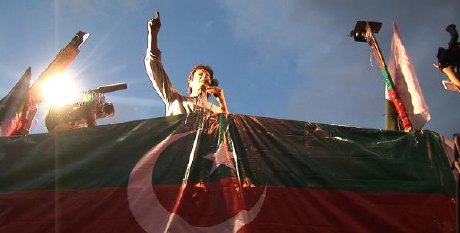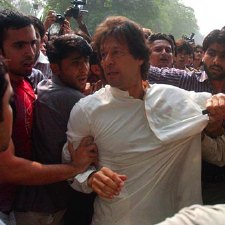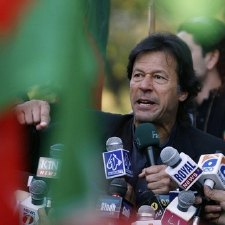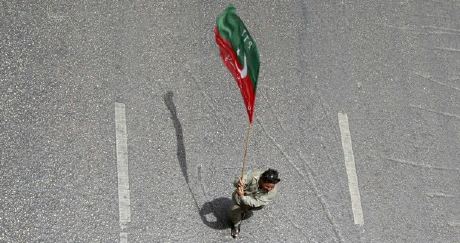Like many Pakistanis, I admire Imran Khan and his sincerity. But supporting him politically is a different matter. He and his party – Pakistan Tehreek-i-Insaaf (PTI) – have some serious soul searching to do before people give it their political support.
Imran Khan is one of the few principled politicians we have. There is no doubt that he truly cares about the country. His bold stance on May 12 and his consistent support for the restoration of the judiciary was unmatched by any other prominent politician. His cancer hospital and the projects he has started in the field of education have been praised even by many of his critics.
Someone like myself, who is dissatisfied with the politics and corruption of the leading parties, is naturally attracted to Imran Khan who talks about principles and accountability. However, as much as I like Imran for his honesty and devotion to the country, I have some concerns about him and can not help agreeing with Shafqat Mahmood’s statement that Imran never misses an opportunity to miss an opportunity.
Being politically inclined, I have even considered joining PTI at times, but reservations about his politics prevent me from doing so.
Imran Khan has been in politics for 13 years, and this is a long enough period to develop the party into a vibrant, democratic entity. Unfortunately, PTI still comes across more like an Imran Khan fan club rather than a democratic political party. For the most part, there is an absence of grass roots forums that meet regularly where any party member can raise issues and be heard, and the party line almost completely comes from the top.
Secondly, Imran does not realize that politics requires an appropriate mix of idealism and pragmatism and confuses this balancing act with opportunism. If he wants to serve the people of Pakistan by coming into power, then his decisions should be geared towards that goal. He had an excellent opportunity to launch himself when Nawaz Sharif offered him 20 odd seats in 1997 and again when Musharraf was willing to help him become the prime minister. Instead of spurning these offers, he should have taken a few ministries and worked hard on demonstrating through performance that he was someone who could truly deliver if given a chance. This could have provided him with the impetus needed to launch PTI into a force capable of getting elected into power on its own and then implement its reform agenda.
This unwillingness to balance idealism and pragmatism also creates doubts about his ability to deliver even if he came into power some day. It makes one wonder whether he would really take a practical approach towards addressing the country’s problems.
On top of all this, Imran Khan has a very confused stance on the Taliban where he still falls well short of fully condemning them.
He has been very consistently and forcefully bashing the Americans in recent years but the same kind of condemnation for the Taliban has not been forthcoming. This sharp contrast, when the Taliban have killed many more Pakistanis than the American drones, and when they are directly trying to destroy the state structure to establish their own rule, is hard to understand. It has taken some strong criticism for Imran Khan to finally make a few “too little too late” statements criticizing the Taliban, whereas what one expects from a good leader is the ability to clearly identify and point out a problem well ahead of time.
His stance on the current situation in Swat has again left a lot to be desired. He first vehemently opposed the military operation but did not explain what the government should do when the Taliban break a peace agreement and keep on expanding into neighbouring districts as they blatantly did after the Swat deal. Only after coming under regular fire has he finally accepted that a military operation can also be an option. He rightly says that bombings should be avoided and the operation should be carefully targeted, but the national debate could have been more focused on discussing how military action can be carried out in a way that minimizes civilian suffering if he and others had not been creating confusion by insisting that there should never be an operation.
In yet another example of muddled thinking, he now argues that before sending the army, a group of politicians should have been allowed to go and try to convince the Taliban to abide by the Swat peace deal. This makes one wonder why he did not publically propose this in the days leading up to the operation and what he is trying to accomplish by undermining the military’s efforts now that the time for this idea has clearly passed.
I really admire Imran Khan for his sincerity, but these are some of the serious issues that he and his party have to come to grips with, before PTI can make serious headway in realizing its full potential.
























































Imran Khan’s pro-Taliban stance is a total and complete put off. It makes him seem like an opportunist trying to win the right. I would want someone to lead Pakistan whose head isn’t full of run-of-the-mill conspiracy theories, someone who is willing to move away from futile but populist America-bashing towards a more substantial and introspective approach to the country’s problems. Mr Khan is certainly not that person.
Sometimes, Imran Khan reminds me of Asghar Khan. A good upright man, who was never able to transform his vision into a successful political movement. Imran Khan’s vision is a bit foggy, too. One can’t tell from his pronouncements if he is a mullah or moderate, pro or anit-Taliban, pro-sharia or not. He says he is for the rule of law, but quotes examples of the Omayyad caliphs and Emperor Aurangzeb as great upholders of the rule of law. One wonders what history books he must have been reading. Before the 2008 elections he exhorted the young people to get out and vote in large numbers to beat the rigging of election that he feared would happen. A lot of people turned up to vote, but Imran Khan was not there. And then, he has this inexplicable affection for the tribal system and Jirgas and the so-called Nizam-e-Adl, or anything that predates modernity.
aqil sajjad:
kudos for balanced post:)
increasingly he reminds me of another person whose sincerity is above doubt
he is the new Air Marshal Asghar Imran Khan
Creating and expanding a major political party is a non-trivial task. The various Muslim Leagues (A-Z) have in recent history been sustained either by land-owning feudals, or by military dictators. The MQM was created by Zia to offset the PPP’s power in urban Sindh, and everyone knows that it is sustained by criminal gangs. The PPP was formed as a principled, national party; however, the ideological focus has since then disappeared, although it still retains a dedicated, hard-working base at the grass-roots level. Which leaves the “religious” parties, who, perhaps ironically, have a lot of good attributes lacking in the mainstream parties.
The main problem with Imran Khan’s party is that his core support comes from the professional/educated urban middle-class which is probably the least politically active group in the country. I understand his hesitation at becoming part of another party’s cabinet. First, with corrupt people all around him, he would not be able to make an impact. And second, no party will allow him to gain popularity and upset their internal status-quo.
But who knows, maybe a few cycles of fair and free elections will enable to come to power on his own strength….hope springs eternal.
i smwht agree wth the writers analysis bt still cnt stop supporting him…if u hve got all the bad paths u shd chose the bttr one from all those bad ones…thts wt the problm is…most of the party followers are youngstrz n they follow him jst bcoz hes the bttr of the lot…hv to support him as the lst optn may b…atleast he does wht he says n is nt a hypocrite um sure….